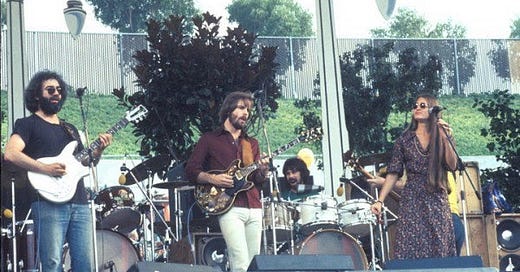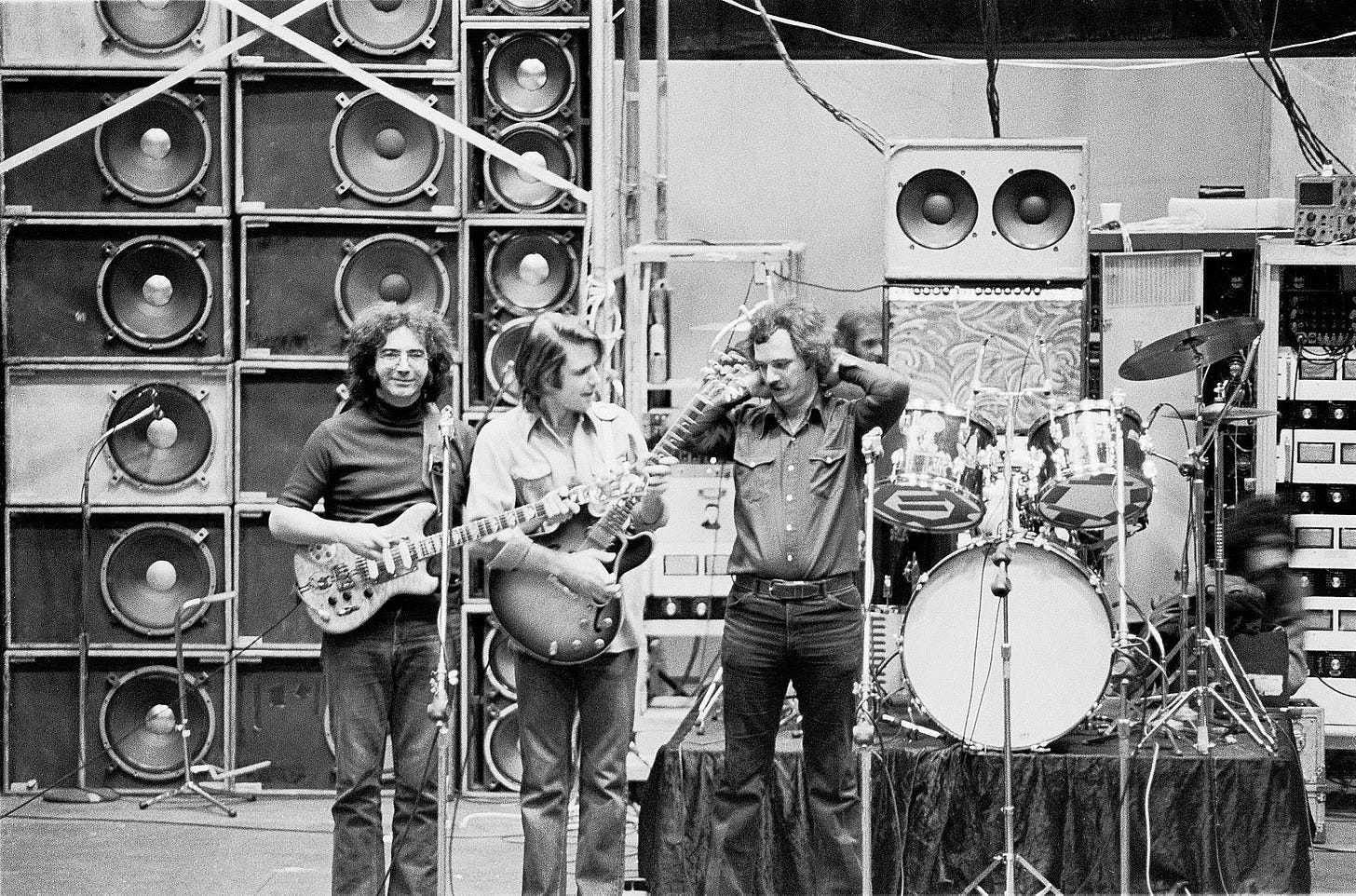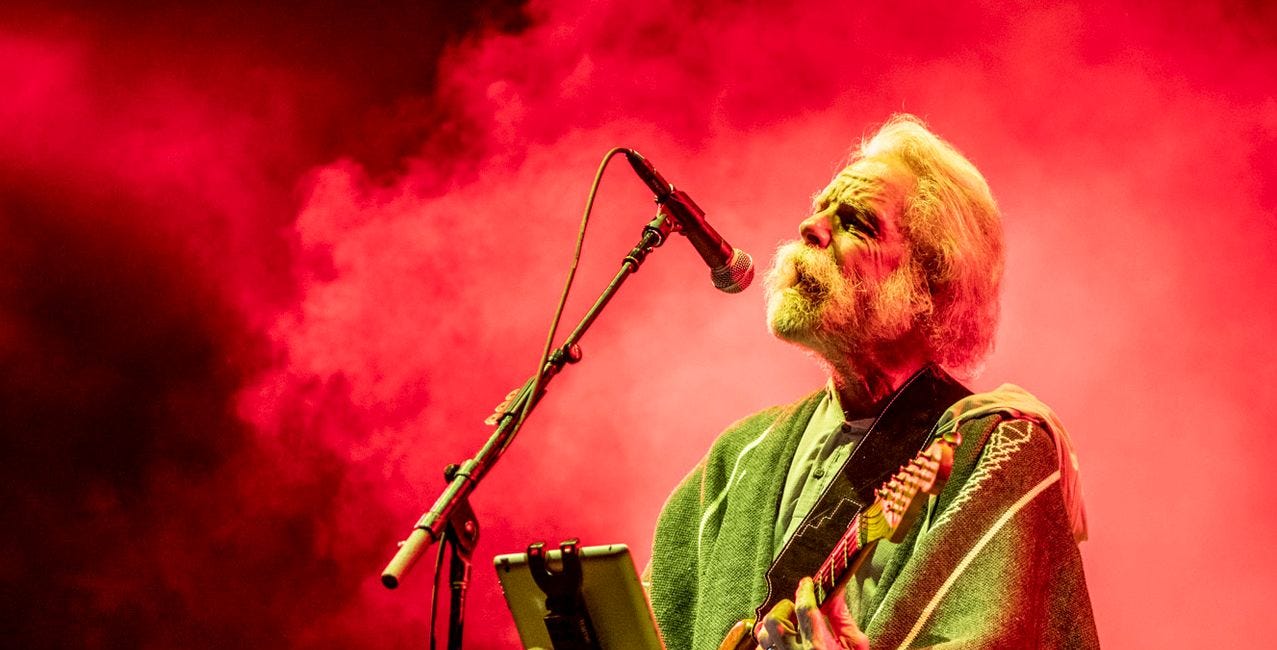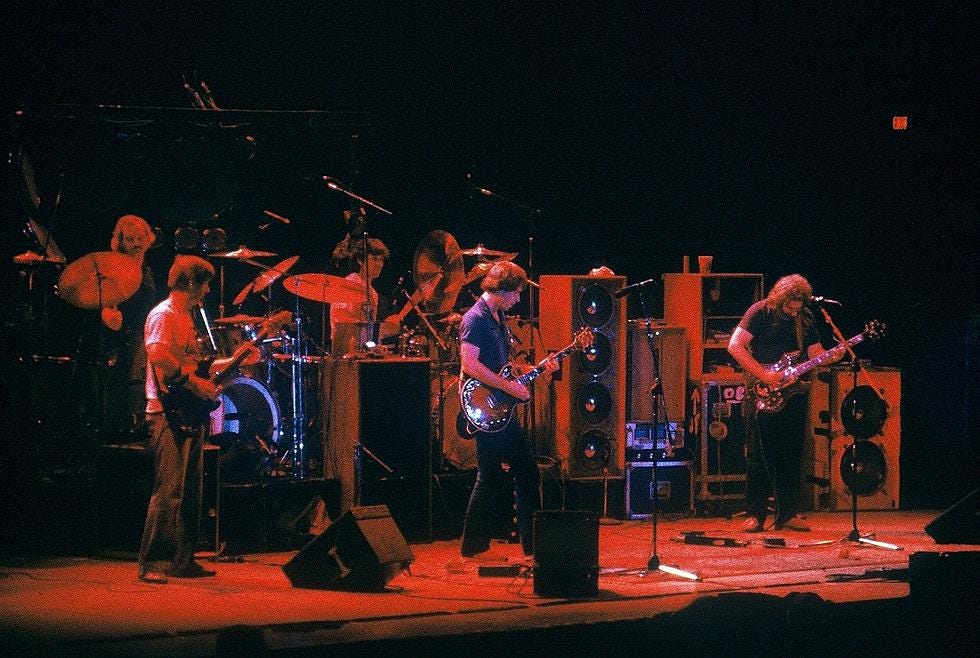Top 25 Grateful Dead Songs: The best of the best
Let there be songs to fill the air.
We’ve finally done it, we’ve made it to the final five from my Top 25 Grateful Dead songs.
As a recap, here are the other songs on the list:
“Foolish Heart”
“West LA Fadeaway”
“Deal”
“Bird Song”
“Sugaree”
“Touch of Grey”
“Casey Jones”
“Uncle John’s Band”
“Scarlet > Fire”
“Dark Star”
“He’s Gone”
“Althea”
“It Must’ve Been the Roses”“Brokedown Palace”“Here Comes Sunshine”
“Eyes of the World”
“The Music Never Stopped”
“Estimated Prophet”
“The Other One”
“Cassidy”
“Feel Like a Stranger”
With that out of the way (and with apologies to “Terrapin Station,” “Ship of Fools” and “China Doll,” songs I probably should have included but either forgot or didn’t find the right space for them, let’s enter Grateful Dead Mount Olympus and talk about my picks for the five best songs in their catalogue.
“Franklin's Tower”
For a long stretch of my life, this was my favorite Grateful Dead tune. The fast tempo and Jerry Garcia’s lead work make “Franklin’s Tower” a track that easily hooks you. I find myself drawn to both the slinky, bright sound of the music (following in the footsteps of “Here Comes Sunshine” and “Eyes of the World”) and the images created in the lyrics.
What exactly does “if you plant ice, you’re gonna harvest wind” mean? I don’t know but also it doesn’t really matter.
There are some discursive, expansive elements to the song, but it still feels focused and tight as it strikes a great balance (balance is going to be an operative word in this post).
It’s also the song through which I began to see the Dead not just as a psychedelic relic of the 1960s but rather a band who existed beyond a specific historical and cultural moment in time.
It’s when the band’s work—really post Workingman’s Dead/American Beauty—opened up for me as an early listener. I might have just stopped at Workingman’s Dead/American Beauty had I not listened to “Franklin’s Tower” as much as I have, and thus I would have missed out on so much.
I do gravitate towards the album version and think it’s an example of the Dead at their best in the studio.
But it is a song that did have a real presence when performed live, particularly as part of the “Help > Slip> Frank” sequence like you hear in this 1975 version collected on the One From the Vault release.
“Dire Wolf”
I took “Dire Wolf” for granted in my initial spins of Workingman’s Dead. I’d get blinded by “Uncle John’s Band” or “Casey Jones,” but now it’s probably my favorite track on that album.
I think really gaining an appreciation for country music—thanks to the Ken Burns documentary on the subject leading to hours spent listening to Willie Nelson and Waylon Jennings1—gave me the ears to properly hear this song.
Garcia’s pedal steel places it firmly within that country music tradition; truly, it’s the first thing I notice whenever I listen to “Dire Wolf.” It’s as if Garcia is creating outlaw country before that term even existed. The pedal steel as well as the more intricate vocal harmonies make this one that really shines on the studio version.
Though I’ve enjoyed the live versions I’ve heard, it’s so tough to replicate what they were able to accomplish in the studio in the live arena.
The whole song is a Garcia showcase between his pedal steel work and the lead vocals, singing lyrics filled with an element of darkness and malice, represented by the titular dire wolf, “six hundred pounds of sin,” and the chorus of “don’t murder me, I beg of you don’t murder me.” One of the things that made the Dead special is their willingness to eschew the path of more standard popular music and go to these dark and scary places. The music isn’t particularly foreboding, but when you dig into those lyrics you really get that sense of menace.
The version of “Dire Wolf” on Day of the Dead, performed by the Lone Bellow, is a favorite of mine.
“Ripple”
“Ripple” was one of poet Robert Creeley’s favorite songs, which is quite the vote of confidence.
You can certainly understand why—the lyrics are of a quality that even without the music, they could function as a poem. The chorus is even a haiku!
While there are so many beautiful lines in the song, these ones are my favorite (and adorn my e-mail signature):
There is a road, no simple highway
Between the dawn and the dark of night
And if you go no one may follow
That path is for your steps alone
“Ripple” lends itself to close reading and interpretation, which I could certainly do here. I’ll spare you all though. But those interpretations and readings are not what makes “Ripple” so special. Rather, it’s that there can be those interpretations. Then, you add beautiful acoustic music and you have maybe the most beautiful thing the Grateful Dead produced.
The whole is more than the sum of its parts. You wouldn’t expect this song, relative to the other things the Dead did, to be such a touchstone. But “Ripple” is the Dead song that has fully transcended, becoming a kind of hymn or standard.
Musically and lyrically, the Dead did it all—they played songs that were fun and made you dance, performed sonic experimentations, went into the dark parts of human experience, and (as you hear on “Ripple”) landed on these moments of immense beauty and tranquility.
I feel as though I’m coming up short explaining my love for “Ripple,” but that’s the problem with a song like this. You can’t take it apart like you might do for another. It just… is, and in its being is its beauty. Just listen, and I’m sure you’ll hear and agree.
“Playing in the Band”
As I mentioned in my post focusing on five songs he wrote, and in a bit of contrarian thinking/zagging on my part, Bob Weir is my favorite member of the Dead.
Top 25 Grateful Dead Songs: Bobby
As I’ve talked about a few times in my Grateful Dead posts here, I’m a bit of a Bob Weir apologist. He gets a little overshadowed by everyone else in the group and, thus, doesn’t get his due. But these songs, my five favorite Bobby tunes (save for whatever ones will appear in my final Top 5… coming soon…), are all standouts in the Dead’s discography. So…
Bobby’s “workman-like” approach, a figure who did not have the same almost cult-y baggage put upon him, makes him much more relatable to me. There are certainly mystical elements to Bobby’s songs, I don’t want to make it seem like there isn’t that element to his work, but we arrive at it in a way that’s very… grounded in the real world. As I said, it’s almost Springsteen-ian.
What makes “Playing” so special to me are partially the lyrics, which are this joyous celebration of being in a group and playing music.
In a way, it’s like “The Music Never Stopped,” which lyrically covers much of the same ground.
A line like “But I can’t stop for nothing, I’m just playing in the band” gets to the heart of it, of why the Dead were these great road warriors and why we fans are so drawn to their music.
The final verse, with its biblical references and imagery, is perhaps my favorite.
Standing on a tower
World at my command
You just keep a turning
While I'm playing in the band
If a man among you
Got no sin upon his hand
Let him cast a stone at me
For playing in the band
Bobby’s singing about how he could have everything, but what he wants to do is to be “playing in the band.” It’s such a wonderful sentiment about the importance of music and camaraderie.
Appropriately enough, it also allows the other members of the band to shine. The rhythm section is so vital, so Phil Lesh and Bill Kreutzmann and Mickey Hart all get to bring it (it’s also composed in 10/4 time, which gives it some rhythmic distinction). Jerry’s lead work complements Bobby’s rhythm and singing, while it also provides an arena for great backing vocals too when performed live (Brent Mydland was great in this regard, but the real all star was Donna Jean Godchaux, as you can hear in the performance I’ve posted below).
The structured part of the song, the verses and chorus, are so melodic and catchy that I’ll get it stuck in my head at least once a day. When performed live, after that third verse the band could launch into an exploratory jam that could go on and out into all kinds of new sonic spaces.
The best versions of “Playing” strike a balance (that word again)—there’s room for jamming but it doesn’t go too far afield. This version, the second-rated version of the song on Heady Version, is to my mind an example of this with ample jamming and improvisation but with a focusing intensity.
”Brown-Eyed Women”
“Brown-Eyed Women” is the other song that, on a given day, I’ll say is my absolute favorite Grateful Dead song. Appropriately enough, for this group where the live performance was paramount, “Brown-Eyed Women” is a song that was never recorded in the studio for a traditional album yet it’s one of the Dead’s most frequently played songs.
I feel like, as I mentioned with “Ripple,” it’s a song where the whole is great than the sum of its parts. Highlighting the famous 5/8/77 performance in Cornell is a bit of an obvious choice, but it has this quality where all the parts of the song combine together into something special (and even though it’s the obvious choice, it’s also REALLY good).
You can hear how everyone shines, but it’s not a “it’s your turn, now it’s your turn” thing. Everyone is shining and getting good stuff to play at the same time and that all blends together into something special.
I’ve talked about how the best Dead songs are the ones that find balance, that maintain structure while allowing for exploration. “Brown-Eyed Women” is maybe the ideal example of that kind of a song. There’s room for jamming (no one is mistaking it for a three-minute disposable pop song) but there’s a structure and form that stays in place and keeps things contained ever-so-slightly.
While Jerry’s singing and lead guitar work does steal some of the focus (and rightfully so, especially on the version from Cornell), it also allows for some of my favorite work from Phil on the bass as well as a great bit of drumming from Bill and Mickey.
“Brown-Eyed Women,” which tells a story from the dusty days of the Great Depression and Prohibition, also features some standout Robert Hunter lyrics. I mean, you can’t beat “The bottle was dusty, but the liquor was clean” in my mind.
Conclusion
So there you have it, I’ve revealed my Top 25 Favorite Grateful Dead songs. What songs did I leave out? Did I overrate or underrate? Should I do a series like this for another of my favorite artists?
Incidentally, the Dead would play shows on the same bill as Waylon Jennings in 1973 while I don’t have to elaborate too much on their connection to Willie Nelson.








I think it's a great list, and am happy to see both "Foolish Heart" (one of my faves), and "Touch of Grey" on here. I know some people think daring to like that era is heresy, but I'm not one of 'em.
I might've included "One More Saturday Night," but I'm not sure what song on the list I'd exchange it for.
Separately, you might've already seen this, but Beeside cassettes put out a record of Dead covers recently, with the proceeds going to charity. I mention it because The Tisburys do a pretty good cover of "Franklin's Tower."
https://beesidecassettes.bandcamp.com/album/stuff-your-fridge
As for doing this for other artists? I would love to read it!